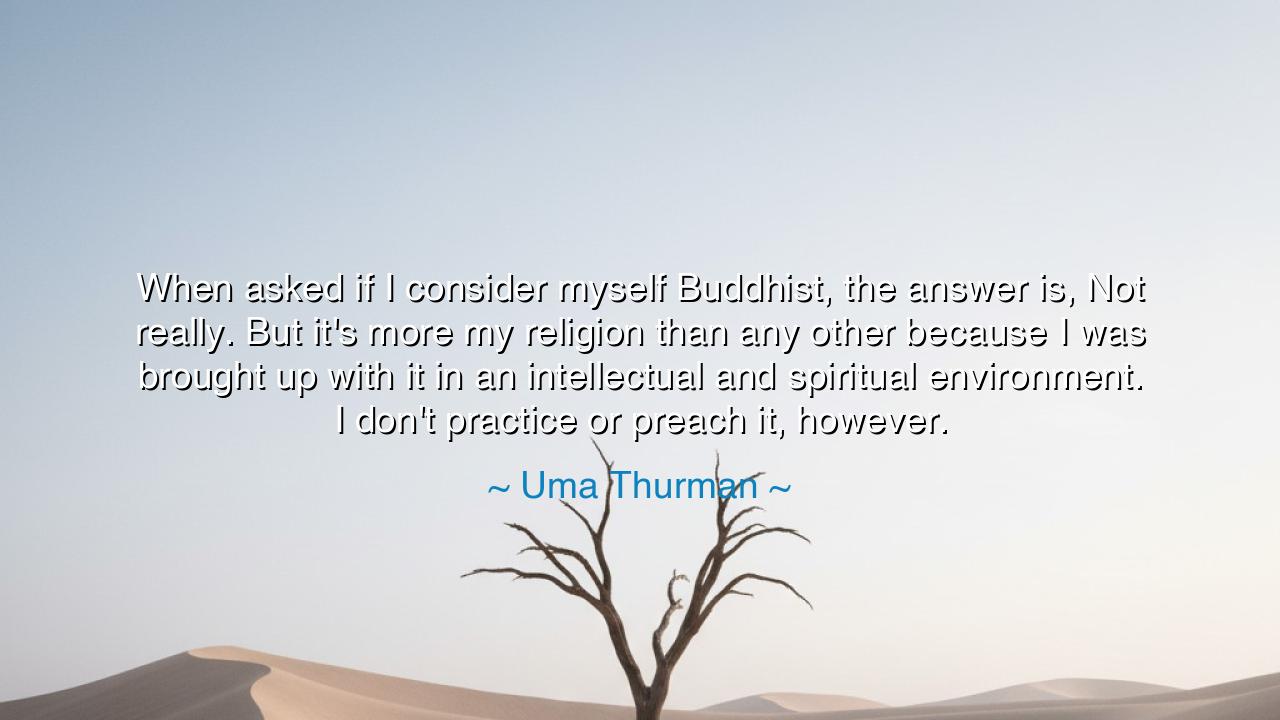
When asked if I consider myself Buddhist, the answer is, Not
When asked if I consider myself Buddhist, the answer is, Not really. But it's more my religion than any other because I was brought up with it in an intellectual and spiritual environment. I don't practice or preach it, however.






The words of Uma Thurman—“When asked if I consider myself Buddhist, the answer is, Not really. But it's more my religion than any other because I was brought up with it in an intellectual and spiritual environment. I don't practice or preach it, however.”—speak with honesty and humility about the mysterious ways in which faith shapes us. She does not claim the mantle of a devoted Buddhist, nor does she renounce the influence it had upon her. Instead, she acknowledges that her upbringing immersed her in its wisdom, leaving traces upon her heart and mind even without ritual practice. In this confession, we find a lesson about identity, belonging, and the subtle yet enduring power of early influences.
The origin of this reflection lies in Thurman’s childhood, for she was raised in a household where Buddhism was not simply studied as an exotic philosophy, but lived as part of an intellectual and spiritual dialogue. Her father, Robert Thurman, was one of the foremost Western scholars of Buddhism, and so she grew surrounded by teachings of compassion, mindfulness, and impermanence. To say that it became “more [her] religion than any other” is to honor the soil from which her worldview sprang, even if she never tilled it into daily ritual or outward devotion.
Her words remind us that religion does not always take the form of practice, temples, or preaching. Sometimes it lives as a quiet presence in the background of one’s life: shaping how one thinks, how one feels, how one sees the world. Just as the child raised near the sea forever hears the rhythm of waves in memory, so too does the soul raised in the presence of spiritual thought carry its echo, even if one sails to other shores. Thurman’s statement reflects this quiet truth—that religion is not only what one declares, but also what silently forms the architecture of the soul.
History gives us many who were shaped by faith they did not fully claim. The philosopher Voltaire was raised within Catholic France, though he grew into one of its fiercest critics. Yet even in his defiance, the structure of Christian thought shaped his reasoning, his ethics, his rebellion. Similarly, countless thinkers and artists have been touched by the faith of their childhood, carrying its imprint even when they did not practice its rites. Thurman’s honesty places her in this tradition: one shaped, but not bound; one influenced, but not possessed.
Her words also speak to a profound truth about spiritual identity: it need not always be rigid or absolute. For some, faith is fire, demanding devotion and sacrifice. For others, it is more like a gentle stream, flowing in the background, nourishing without demanding. Thurman acknowledges that she does not practice or preach, yet the intellectual and spiritual environment of her youth still makes Buddhism more her religion than any other. In this way, she honors her roots while remaining true to her present self.
The lesson here is one of authenticity. We are not bound to claim titles we do not live, nor to pretend piety we do not practice. But neither should we deny the influences that have formed us, for they are part of our story. Thurman teaches us that it is possible to honor the wisdom we have inherited without false devotion, to acknowledge our spiritual heritage without hypocrisy. True integrity lies not in claiming what we are not, but in recognizing honestly what has shaped us.
Practically, this means cultivating gratitude for the teachings that shaped us, even if we walk a different path. If you were raised in a faith, honor the good it gave you—its values, its wisdom, its moments of comfort—even if you do not practice its rituals today. If you find yourself touched by a philosophy or culture that is not fully your own, allow it to enrich you without shame. Above all, live authentically, practicing what resonates in your heart, and acknowledging what has formed your spirit.
Thus, Uma Thurman’s words shine with a quiet and deeply human wisdom: faith can shape us without binding us, and identity is not a cage, but a living memory. She reminds us that we need not preach to be influenced, nor practice to be touched. Life itself is the temple, and honesty the truest act of devotion.






AAdministratorAdministrator
Welcome, honored guests. Please leave a comment, we will respond soon